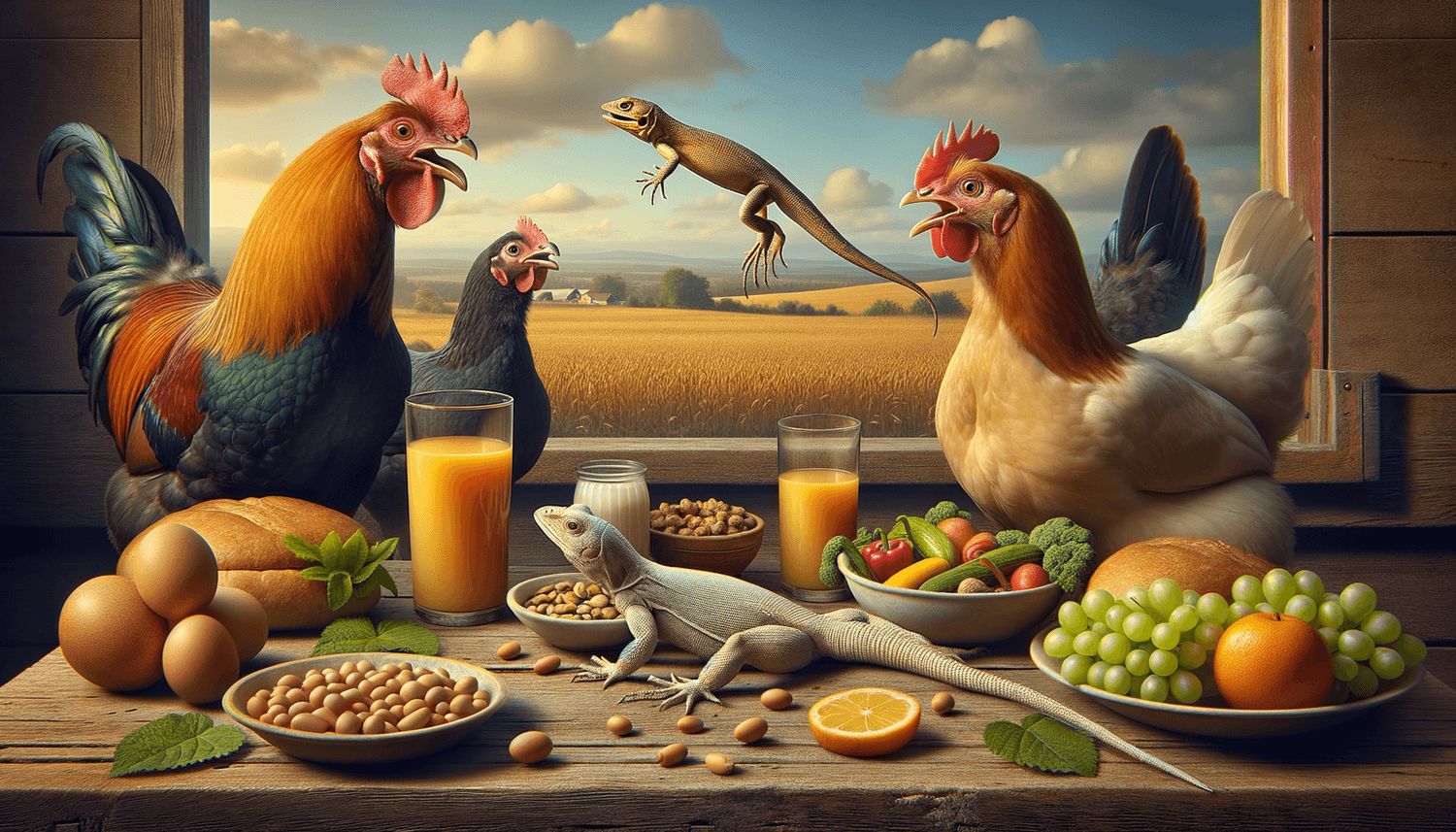Welcome to the clucking amazing world of backyard chickens, where we explore the ins and outs of our fluffy, feathered friends’ diets! Today’s topic is both intriguing and a little bit wild – can chickens eat lizards? As backyard chicken enthusiasts, we know that these lovable creatures have some surprising eating habits. In this blog post, we’ll delve into the world of reptile cuisine for chickens, discussing whether our feathery companions can chow down on lizards or not. Along the way, we’ll discuss the importance of a balanced diet, the potential benefits and risks of such an adventurous menu item, its nutritional value, and the tips and tricks for preparing this unique treat. So buckle up and get ready for a scaly, tasty chicken adventure!
Can chickens eat lizards?
Yes, chickens can eat lizards, and it’s generally safe for them to do so. Chickens are opportunistic omnivores that naturally forage for insects, worms, and small vertebrates, including lizards. Lizards can provide a good source of protein and other essential nutrients for chickens, but as with any food source, moderation and a balanced diet are key to ensuring the overall health and wellbeing of your flock.
A balanced diet for chickens
Just like humans, chickens need a balanced diet to thrive and maintain good health. A well-rounded diet is crucial for their optimal growth, egg production, and overall well-being. While chickens are quite versatile in their eating habits, it’s essential to ensure that their nutritional needs are met, and providing the right composition of food sources plays a significant role in this process.
A chicken’s diet should primarily consist of high-quality chicken feed, which should make up around 80-90% of their diet. This chicken feed is specifically formulated to provide a balanced mix of essential nutrients, including proteins, vitamins, minerals, and carbohydrates, which are crucial for a healthy, productive flock. The remaining 10-20% of their diet can consist of treats like fruits and vegetables. Offering treats should be done in moderation, as excessively feeding treats could cause an imbalance in their nutritional intake and potentially lead to health problems.
Nutritional value of lizards for chickens.
Feeding lizards to chickens can offer both nutritional benefits and add variety to their diet. Lizards are a source of high-quality protein, which supports muscle growth and repair, as well as egg production in laying hens. In addition, lizards can provide some essential amino acids that chickens need for their health and development.
Aside from protein, lizards also contain vitamins and minerals that can be beneficial for chickens. For instance, they are a source of calcium, which is crucial for strong eggshells and maintaining healthy bones in chickens. Moreover, lizards can offer trace minerals such as phosphorus, zinc, and magnesium, which are essential for various biological processes within the chicken’s body.
While lizards may not contribute significantly to a chicken’s hydration, they can provide natural moisture in their diet. This moisture, combined with the protein and other nutrients found in lizards, makes them an attractive and nutritious treat for chickens. However, it should be noted that like any other treat, lizards should not replace a balanced diet or essential chicken feed components, but rather complement them to ensure a healthy and happy flock.
Nutrition table of lizards for chickens.
| Information | Description |
|---|---|
| Nutritional Value | Protein, calcium, phosphorus, zinc, magnesium, and other essential nutrients |
| Suggested Serving Size | Occasional treat, not to exceed 10-20% of the chicken’s total diet |
| Safe Feeding Practices | Ensure that lizards are pesticide-free and from a clean environment |
| Preparation | No preparation needed, chickens will eat lizards whole, as found in nature |
| Potential Risks | Possibility of pesticide exposure or lizards carrying parasites |
| Hydration | Lizards provide natural moisture, but not a significant source of hydration |
| Digestion | Chickens can digest lizards without difficulty as part of their natural foraging habits |
| Seasonal Availability | Depends on geographic location and local lizard population |
| Other Benefits | Adds variety to the chicken’s diet and encourages natural foraging behaviors |
Possible concerns when feeding lizards to chickens
While lizards can provide a nutritious snack for chickens, it’s important to consider some potential concerns. Pesticide exposure, and the possibility of lizards carrying parasites or diseases, should be taken into account when offering these reptile treats. Always ensure that the lizards you provide are sourced from a pesticide-free, clean environment, and consult with local or regional experts in case there are any concerns about specific lizard species native to your area.
Easing into lizard treats
Before offering lizards to your chicken flock, observe their natural foraging behavior and ease them slowly into this new treat. A good starting point might be adding a few small, clean lizards to their enclosure and monitoring their response. If your chickens enjoy the experience without adverse effects, you can gradually include lizards as an occasional treat to keep their diet varied and interesting.
Responsibly managing lizard population
If your chickens develop a taste for lizards and need a regular supply, it’s important to be responsible and mindful of the local lizard population. Over-harvesting could lead to issues in the local ecosystem, so finding a balance where feeding lizards to your chickens won’t disrupt the natural environment is crucial.
Alternative protein sources
If you’re unable or reluctant to provide lizards as a food source for your chickens, there are other alternative protein sources that can be considered. Mealworms, crickets, and other insects offer comparable nutritional benefits and can be fed as a treat alongside your chickens’ regular diet.
In conclusion
Chickens have diverse diets that can include lizards as a nutritious treat. While lizards can offer certain benefits, ensuring safe feeding practices and opting for a balanced diet will keep your chickens happy and healthy. Remember to monitor your flock’s overall health and well-being while introducing any new food sources and enjoy the joys of raising backyard chickens!

















